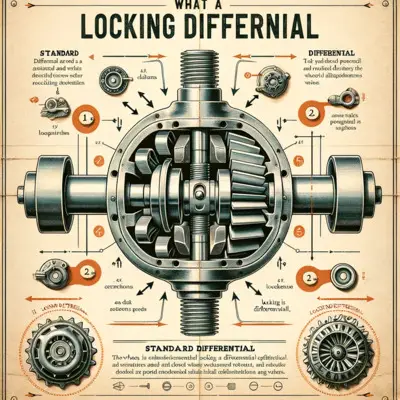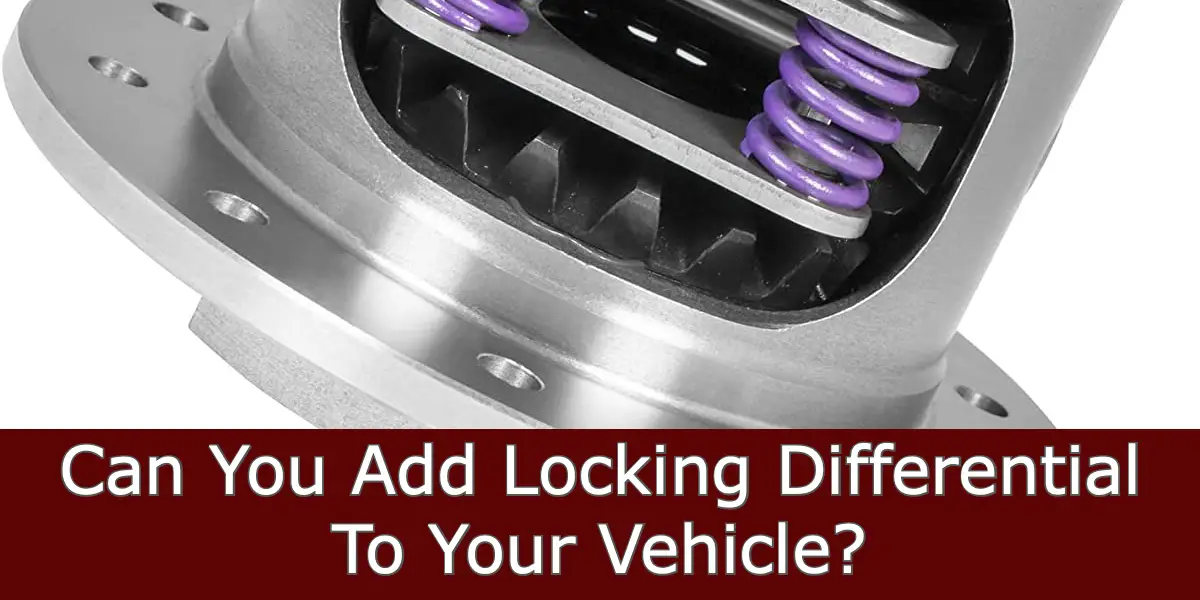Adding a locking differential to your vehicle can provide added security when driving in off-road conditions. Locking differentials are available as an option on some vehicles and can be installed relatively easily by a mechanic.
The added security can make driving in difficult terrain less of a challenge and can provide peace of mind when traveling in remote areas. However, not all vehicles are compatible with a locking differential which makes people hesitant to make the decision.
If we’re not wrong, you’re one of them as well. So, can you add a locking differential to your vehicle? The answer depends on the driving pattern and the make and model of your vehicle. So, stay with us till the end.
What Is Locking Differential?

Locking differential refers to a differential that uses an internal locking mechanism to ensure the difference between the axles’ speeds remains within certain limits. This technology is used in various applications, from vehicular to industrial drives.
Your vehicle’s four wheels have different needs, so the front and swivel axles have to be equipped with differentials to ensure your four-wheel-drive vehicle has proper ground functionality. The various wheels on four-wheel-drive vehicles can draw more power, thanks to the differential incorporated into each front and rear axle.
Generally, a car only has one differential, however, four-wheeled vehicles may have up to three differentials. A differential-lock locks this differential in position, allowing equal amounts of power to reach all four tires throughout the road surface. This equal power allocation makes the push more effective in rugged terrain.
Can You Add a Locking Differential To Your Vehicle?
Are you in the market for a new car, but don’t want to spend the extra money on a locking differential? You’re not alone. In fact, many people still believe that omitting a locking differential from their vehicle’s specification is a safer option. However, this belief is unfounded and could actually end up costing you in the long run.
A locking differential allows your car to continuously spin around its wheels while in motion, preventing it from skidding or spinning out of control. This capability is especially useful when driving on ice or snow, or during high-speed chases.
If your car doesn’t have a locking differential, it can lose traction and eventually become stuck in place. Conversely, if your car has a locking differential, even slight fluctuations in the terrain will cause the differential to engage and prevent the vehicle from spinning out of control.
Depending on your needs, you can add a locking differential to either your rear or front axle. Rear-wheel drive vehicles use a differential that locks the left and right wheels together, while front-wheel drive vehicles use a differential that locks the front and rear wheels together.
However, differential locks are designed for use on roads with a higher level of safety and performance than what is required for normal streets. Differential locks are not typically used on regular city streets as the performance requirements are too high.
There are some exceptions to this rule, however, and differential locks can be used on most city streets as long as they meet the general performance requirements of a street. When shopping for a differential lock, it is important to understand the different levels of security that each provides.
When You Shouldn’t Use A Locking Differential
Differential locks are a common safety feature in cars and trucks. These locks help prevent the car from moving if one of the drive wheels is lost or damaged.
Locking differentials use centrifugal force to create a locking action between the gears, which can prevent your car from spinning if it’s in a slide. If you’re going to be leaving your car in any kind of hurry and don’t want it to spin out, using a locking differential may not be the best option.
Moreover, if you are only driving on the street and have a smooth, level surface to drive on, then you can use a locking differential. But what happens when you need to use your differential lock but can’t because it’s locked? Here are four situations when you should not use your differential lock:
- When the car is stuck in mud or snow. If you can’t get your car unstuck using your levers, break a window to free yourself and call for help.
- When you’re driving on ice or snow-covered roads. Locking your differential will only make matters worse, as it will add extra weight to the drive wheels and cause them to skid even more easily.
- When you need to change a tire on the side of the road.
- When you’re going downhill in a curve and the front-drive wheels are off the ground. If your wheels are in the air, they will not be able to push against the ground to help you turn. This can cause you to lose control of your car and possibly roll over.
Which Trucks and SUVs Come With Factory Locking Differentials?
Lockers are a must-have for experienced off-roading enthusiasts, with many aftermarket manufacturers offering sizes and options to suit various preferences. A few of the 4X4s available with the factory feature locking differential mechanism are a few of the automobiles you can choose from.
| Optional Locking Rear Differentials | Standard Locking Rear Differentials | Front And Rear Locking Differentials |
| Toyota Tundra | Toyota Tacoma TRD Pro | Chevrolet Colorado ZR2 |
| Ram 1500 | Ram 1500 TRX | GMC Sierra AT4X |
| Toyota 4Runner | Chevrolet Silverado ZR1 Off-Road | Mercedes G-Class |
| Toyota Tacoma | Jeep Gladiator Mojave | Chevrolet Silverado ZR2 |
| GMC Sierra | GMC Sierra AT4 | Jeep Gladiator Rubicon |
| Chevrolet Colorado | Toyota Tundra TRD Pro | Jeep Wrangler Rubicon |
| Chevrolet Silverado | ||
| Ford F-150 | Land Rover | |
| Nissan Frontier | Dodge Power Wagon | |
| Nissan Xterra | ||
| Nissan Titan |
Final Words
Adding a locking differential to your truck can provide you with more traction when making turns and can increase the safety of your driving. If you’re considering adding a locking differential to your truck, make sure to consult with a trusted mechanic to ensure that the installation is done correctly and safely. Moreover, it will help you to determine properly whether can you add a locking differential or not to your vehicle.
